Improving Indigenous Community Health: An Opinion Editorial
VerifiedAdded on 2021/04/22
|6
|1090
|89
Essay
AI Summary
This opinion editorial examines the health disparities faced by indigenous communities, particularly Torres Strait Islanders, in Australia. The essay highlights the impact of poor social determinants of health, including employment, education, and financial stability, on the indigenous population's well-being. It emphasizes the importance of the common good in healthcare, advocating for increased participation of indigenous communities in health-related education and services. The editorial discusses the Australian government's efforts to reduce health inequalities, and it explores the role of community engagement and culturally responsive healthcare frameworks. It also addresses the limitations and facilitators of indigenous health workers' participation in healthcare, including issues like burnout and lack of support. The essay concludes by emphasizing the need for equitable participation and increased recruitment of indigenous health workers to promote health education and awareness, ultimately contributing to improved community health outcomes.
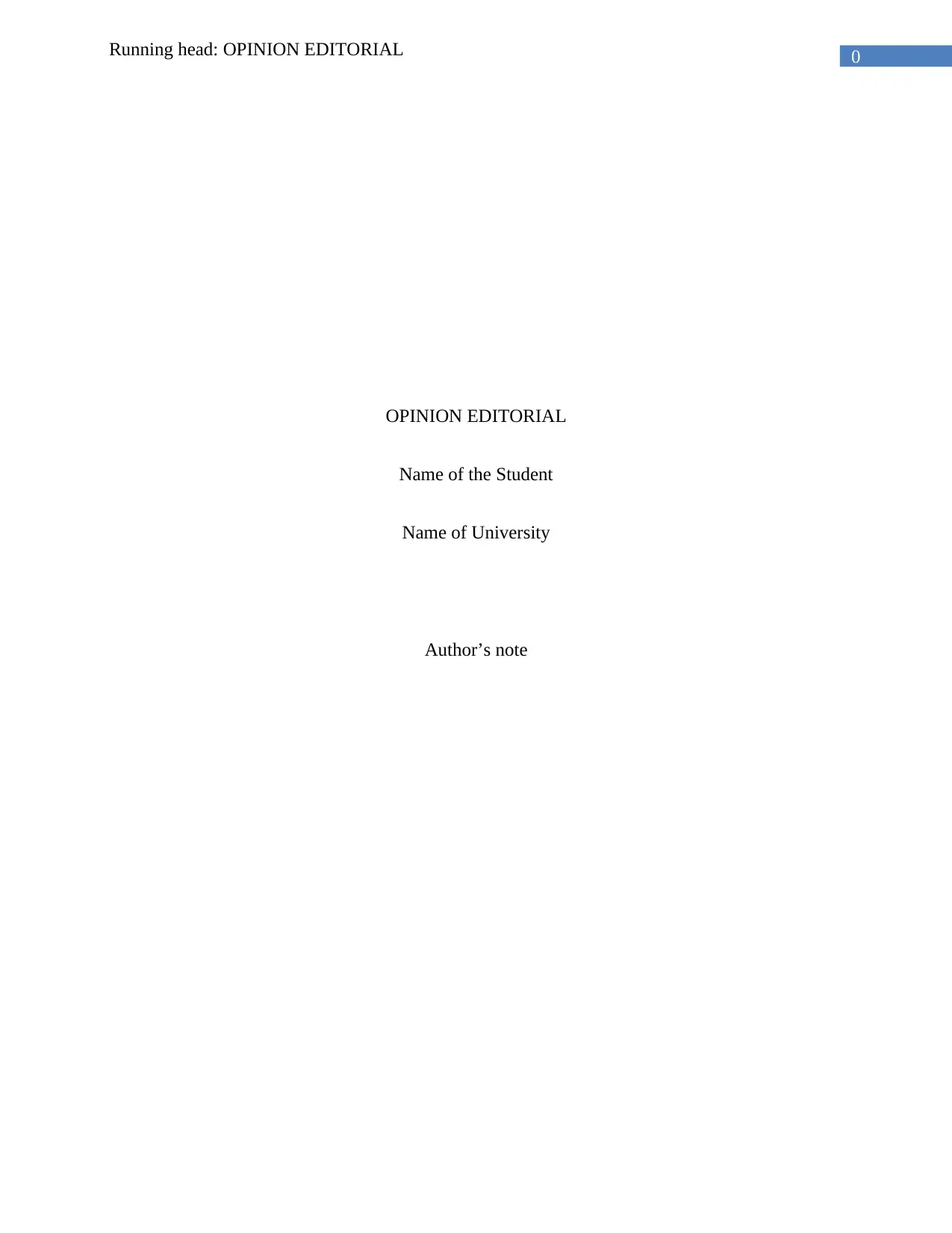
0Running head: OPINION EDITORIAL
OPINION EDITORIAL
Name of the Student
Name of University
Author’s note
OPINION EDITORIAL
Name of the Student
Name of University
Author’s note
Paraphrase This Document
Need a fresh take? Get an instant paraphrase of this document with our AI Paraphraser
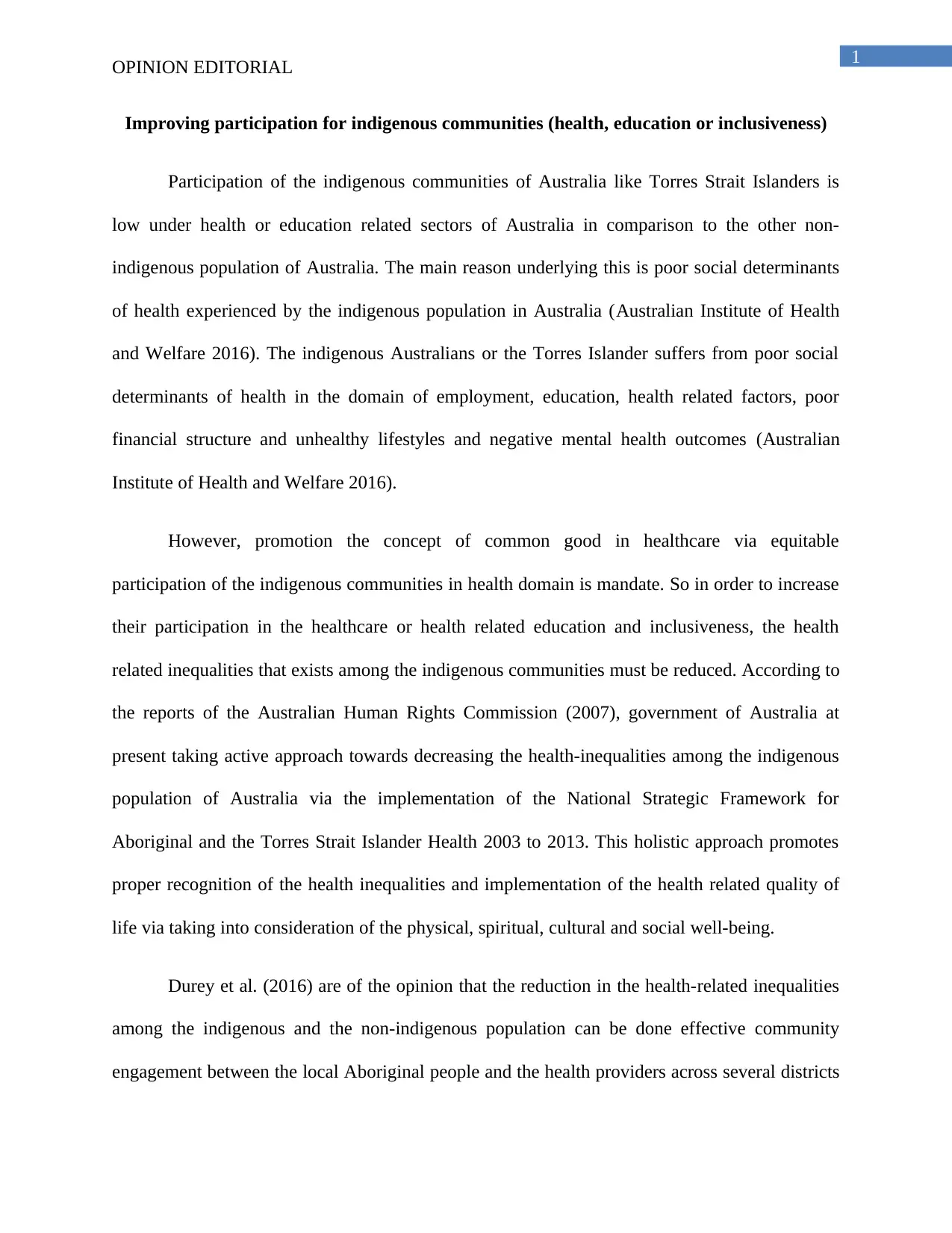
1
OPINION EDITORIAL
Improving participation for indigenous communities (health, education or inclusiveness)
Participation of the indigenous communities of Australia like Torres Strait Islanders is
low under health or education related sectors of Australia in comparison to the other non-
indigenous population of Australia. The main reason underlying this is poor social determinants
of health experienced by the indigenous population in Australia (Australian Institute of Health
and Welfare 2016). The indigenous Australians or the Torres Islander suffers from poor social
determinants of health in the domain of employment, education, health related factors, poor
financial structure and unhealthy lifestyles and negative mental health outcomes (Australian
Institute of Health and Welfare 2016).
However, promotion the concept of common good in healthcare via equitable
participation of the indigenous communities in health domain is mandate. So in order to increase
their participation in the healthcare or health related education and inclusiveness, the health
related inequalities that exists among the indigenous communities must be reduced. According to
the reports of the Australian Human Rights Commission (2007), government of Australia at
present taking active approach towards decreasing the health-inequalities among the indigenous
population of Australia via the implementation of the National Strategic Framework for
Aboriginal and the Torres Strait Islander Health 2003 to 2013. This holistic approach promotes
proper recognition of the health inequalities and implementation of the health related quality of
life via taking into consideration of the physical, spiritual, cultural and social well-being.
Durey et al. (2016) are of the opinion that the reduction in the health-related inequalities
among the indigenous and the non-indigenous population can be done effective community
engagement between the local Aboriginal people and the health providers across several districts
OPINION EDITORIAL
Improving participation for indigenous communities (health, education or inclusiveness)
Participation of the indigenous communities of Australia like Torres Strait Islanders is
low under health or education related sectors of Australia in comparison to the other non-
indigenous population of Australia. The main reason underlying this is poor social determinants
of health experienced by the indigenous population in Australia (Australian Institute of Health
and Welfare 2016). The indigenous Australians or the Torres Islander suffers from poor social
determinants of health in the domain of employment, education, health related factors, poor
financial structure and unhealthy lifestyles and negative mental health outcomes (Australian
Institute of Health and Welfare 2016).
However, promotion the concept of common good in healthcare via equitable
participation of the indigenous communities in health domain is mandate. So in order to increase
their participation in the healthcare or health related education and inclusiveness, the health
related inequalities that exists among the indigenous communities must be reduced. According to
the reports of the Australian Human Rights Commission (2007), government of Australia at
present taking active approach towards decreasing the health-inequalities among the indigenous
population of Australia via the implementation of the National Strategic Framework for
Aboriginal and the Torres Strait Islander Health 2003 to 2013. This holistic approach promotes
proper recognition of the health inequalities and implementation of the health related quality of
life via taking into consideration of the physical, spiritual, cultural and social well-being.
Durey et al. (2016) are of the opinion that the reduction in the health-related inequalities
among the indigenous and the non-indigenous population can be done effective community
engagement between the local Aboriginal people and the health providers across several districts
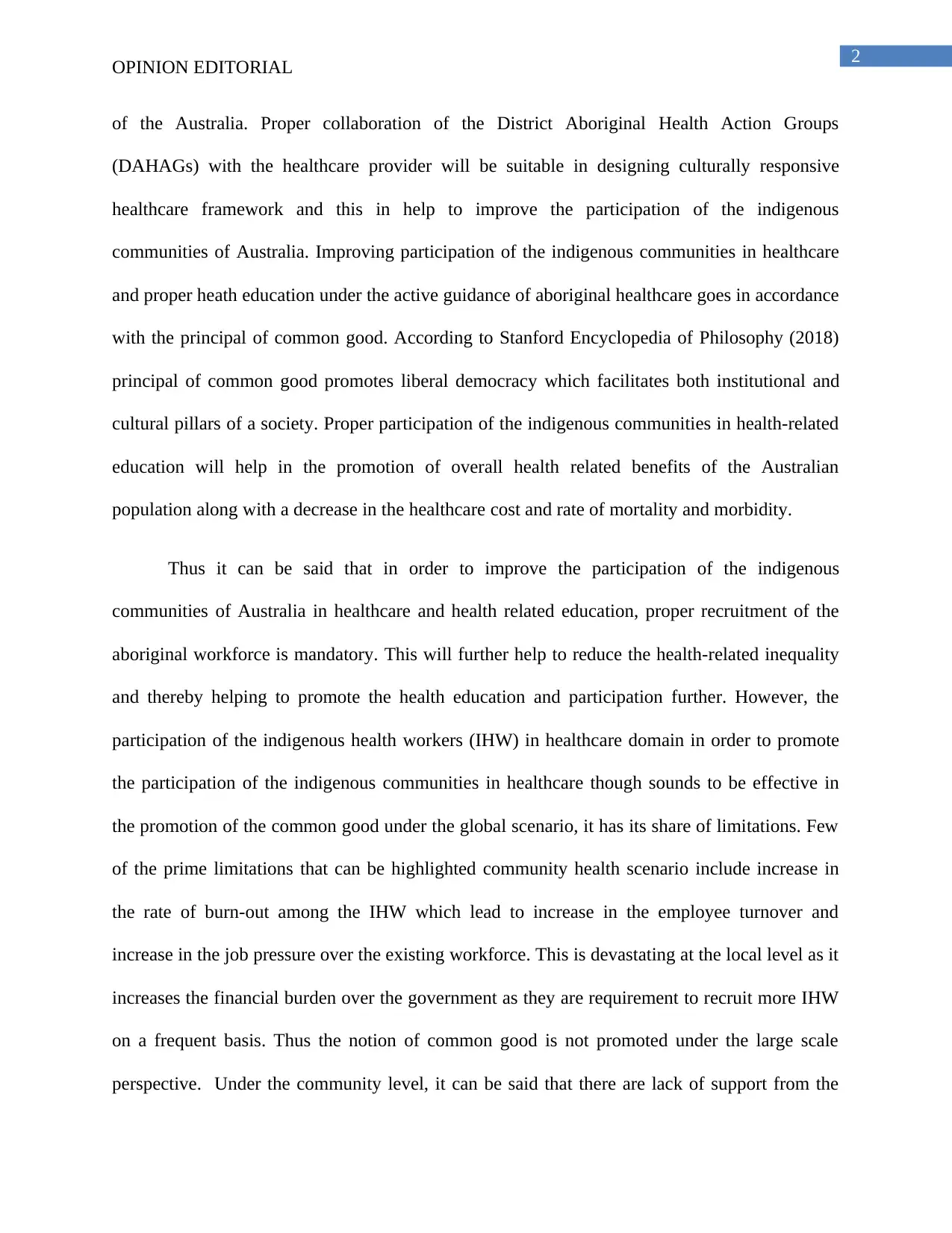
2
OPINION EDITORIAL
of the Australia. Proper collaboration of the District Aboriginal Health Action Groups
(DAHAGs) with the healthcare provider will be suitable in designing culturally responsive
healthcare framework and this in help to improve the participation of the indigenous
communities of Australia. Improving participation of the indigenous communities in healthcare
and proper heath education under the active guidance of aboriginal healthcare goes in accordance
with the principal of common good. According to Stanford Encyclopedia of Philosophy (2018)
principal of common good promotes liberal democracy which facilitates both institutional and
cultural pillars of a society. Proper participation of the indigenous communities in health-related
education will help in the promotion of overall health related benefits of the Australian
population along with a decrease in the healthcare cost and rate of mortality and morbidity.
Thus it can be said that in order to improve the participation of the indigenous
communities of Australia in healthcare and health related education, proper recruitment of the
aboriginal workforce is mandatory. This will further help to reduce the health-related inequality
and thereby helping to promote the health education and participation further. However, the
participation of the indigenous health workers (IHW) in healthcare domain in order to promote
the participation of the indigenous communities in healthcare though sounds to be effective in
the promotion of the common good under the global scenario, it has its share of limitations. Few
of the prime limitations that can be highlighted community health scenario include increase in
the rate of burn-out among the IHW which lead to increase in the employee turnover and
increase in the job pressure over the existing workforce. This is devastating at the local level as it
increases the financial burden over the government as they are requirement to recruit more IHW
on a frequent basis. Thus the notion of common good is not promoted under the large scale
perspective. Under the community level, it can be said that there are lack of support from the
OPINION EDITORIAL
of the Australia. Proper collaboration of the District Aboriginal Health Action Groups
(DAHAGs) with the healthcare provider will be suitable in designing culturally responsive
healthcare framework and this in help to improve the participation of the indigenous
communities of Australia. Improving participation of the indigenous communities in healthcare
and proper heath education under the active guidance of aboriginal healthcare goes in accordance
with the principal of common good. According to Stanford Encyclopedia of Philosophy (2018)
principal of common good promotes liberal democracy which facilitates both institutional and
cultural pillars of a society. Proper participation of the indigenous communities in health-related
education will help in the promotion of overall health related benefits of the Australian
population along with a decrease in the healthcare cost and rate of mortality and morbidity.
Thus it can be said that in order to improve the participation of the indigenous
communities of Australia in healthcare and health related education, proper recruitment of the
aboriginal workforce is mandatory. This will further help to reduce the health-related inequality
and thereby helping to promote the health education and participation further. However, the
participation of the indigenous health workers (IHW) in healthcare domain in order to promote
the participation of the indigenous communities in healthcare though sounds to be effective in
the promotion of the common good under the global scenario, it has its share of limitations. Few
of the prime limitations that can be highlighted community health scenario include increase in
the rate of burn-out among the IHW which lead to increase in the employee turnover and
increase in the job pressure over the existing workforce. This is devastating at the local level as it
increases the financial burden over the government as they are requirement to recruit more IHW
on a frequent basis. Thus the notion of common good is not promoted under the large scale
perspective. Under the community level, it can be said that there are lack of support from the
⊘ This is a preview!⊘
Do you want full access?
Subscribe today to unlock all pages.

Trusted by 1+ million students worldwide
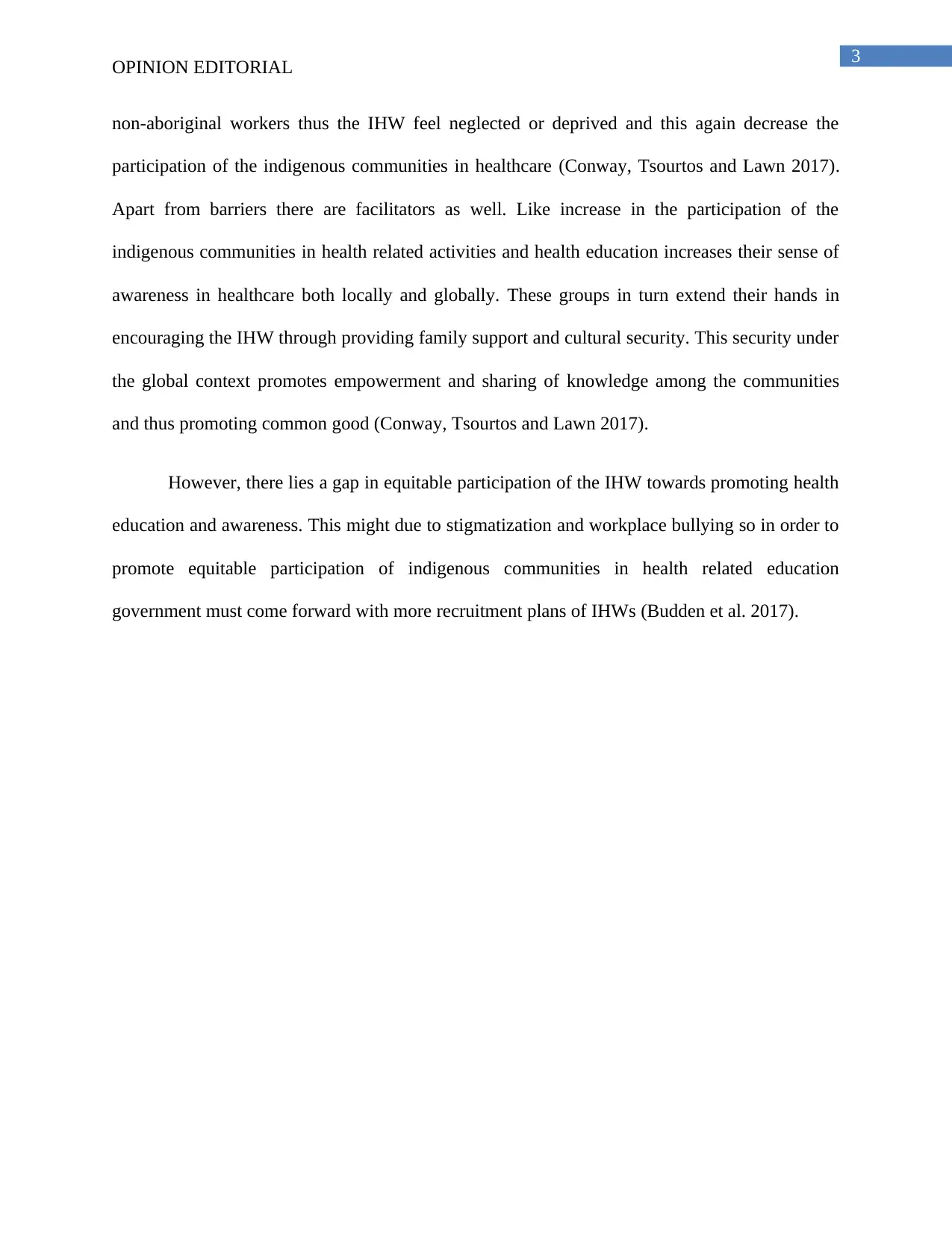
3
OPINION EDITORIAL
non-aboriginal workers thus the IHW feel neglected or deprived and this again decrease the
participation of the indigenous communities in healthcare (Conway, Tsourtos and Lawn 2017).
Apart from barriers there are facilitators as well. Like increase in the participation of the
indigenous communities in health related activities and health education increases their sense of
awareness in healthcare both locally and globally. These groups in turn extend their hands in
encouraging the IHW through providing family support and cultural security. This security under
the global context promotes empowerment and sharing of knowledge among the communities
and thus promoting common good (Conway, Tsourtos and Lawn 2017).
However, there lies a gap in equitable participation of the IHW towards promoting health
education and awareness. This might due to stigmatization and workplace bullying so in order to
promote equitable participation of indigenous communities in health related education
government must come forward with more recruitment plans of IHWs (Budden et al. 2017).
OPINION EDITORIAL
non-aboriginal workers thus the IHW feel neglected or deprived and this again decrease the
participation of the indigenous communities in healthcare (Conway, Tsourtos and Lawn 2017).
Apart from barriers there are facilitators as well. Like increase in the participation of the
indigenous communities in health related activities and health education increases their sense of
awareness in healthcare both locally and globally. These groups in turn extend their hands in
encouraging the IHW through providing family support and cultural security. This security under
the global context promotes empowerment and sharing of knowledge among the communities
and thus promoting common good (Conway, Tsourtos and Lawn 2017).
However, there lies a gap in equitable participation of the IHW towards promoting health
education and awareness. This might due to stigmatization and workplace bullying so in order to
promote equitable participation of indigenous communities in health related education
government must come forward with more recruitment plans of IHWs (Budden et al. 2017).
Paraphrase This Document
Need a fresh take? Get an instant paraphrase of this document with our AI Paraphraser
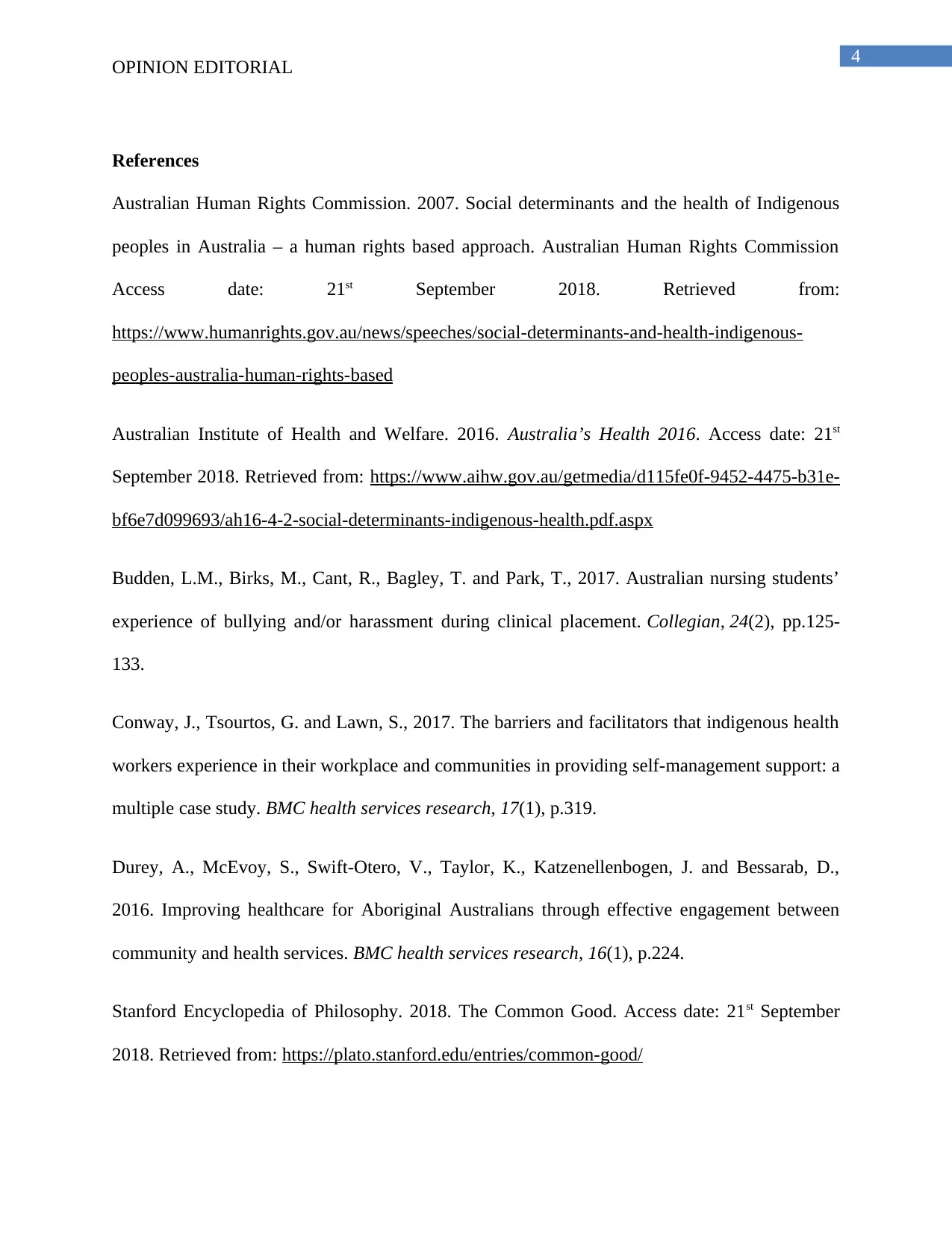
4
OPINION EDITORIAL
References
Australian Human Rights Commission. 2007. Social determinants and the health of Indigenous
peoples in Australia – a human rights based approach. Australian Human Rights Commission
Access date: 21st September 2018. Retrieved from:
https://www.humanrights.gov.au/news/speeches/social-determinants-and-health-indigenous-
peoples-australia-human-rights-based
Australian Institute of Health and Welfare. 2016. Australia’s Health 2016. Access date: 21st
September 2018. Retrieved from: https://www.aihw.gov.au/getmedia/d115fe0f-9452-4475-b31e-
bf6e7d099693/ah16-4-2-social-determinants-indigenous-health.pdf.aspx
Budden, L.M., Birks, M., Cant, R., Bagley, T. and Park, T., 2017. Australian nursing students’
experience of bullying and/or harassment during clinical placement. Collegian, 24(2), pp.125-
133.
Conway, J., Tsourtos, G. and Lawn, S., 2017. The barriers and facilitators that indigenous health
workers experience in their workplace and communities in providing self-management support: a
multiple case study. BMC health services research, 17(1), p.319.
Durey, A., McEvoy, S., Swift-Otero, V., Taylor, K., Katzenellenbogen, J. and Bessarab, D.,
2016. Improving healthcare for Aboriginal Australians through effective engagement between
community and health services. BMC health services research, 16(1), p.224.
Stanford Encyclopedia of Philosophy. 2018. The Common Good. Access date: 21st September
2018. Retrieved from: https://plato.stanford.edu/entries/common-good/
OPINION EDITORIAL
References
Australian Human Rights Commission. 2007. Social determinants and the health of Indigenous
peoples in Australia – a human rights based approach. Australian Human Rights Commission
Access date: 21st September 2018. Retrieved from:
https://www.humanrights.gov.au/news/speeches/social-determinants-and-health-indigenous-
peoples-australia-human-rights-based
Australian Institute of Health and Welfare. 2016. Australia’s Health 2016. Access date: 21st
September 2018. Retrieved from: https://www.aihw.gov.au/getmedia/d115fe0f-9452-4475-b31e-
bf6e7d099693/ah16-4-2-social-determinants-indigenous-health.pdf.aspx
Budden, L.M., Birks, M., Cant, R., Bagley, T. and Park, T., 2017. Australian nursing students’
experience of bullying and/or harassment during clinical placement. Collegian, 24(2), pp.125-
133.
Conway, J., Tsourtos, G. and Lawn, S., 2017. The barriers and facilitators that indigenous health
workers experience in their workplace and communities in providing self-management support: a
multiple case study. BMC health services research, 17(1), p.319.
Durey, A., McEvoy, S., Swift-Otero, V., Taylor, K., Katzenellenbogen, J. and Bessarab, D.,
2016. Improving healthcare for Aboriginal Australians through effective engagement between
community and health services. BMC health services research, 16(1), p.224.
Stanford Encyclopedia of Philosophy. 2018. The Common Good. Access date: 21st September
2018. Retrieved from: https://plato.stanford.edu/entries/common-good/
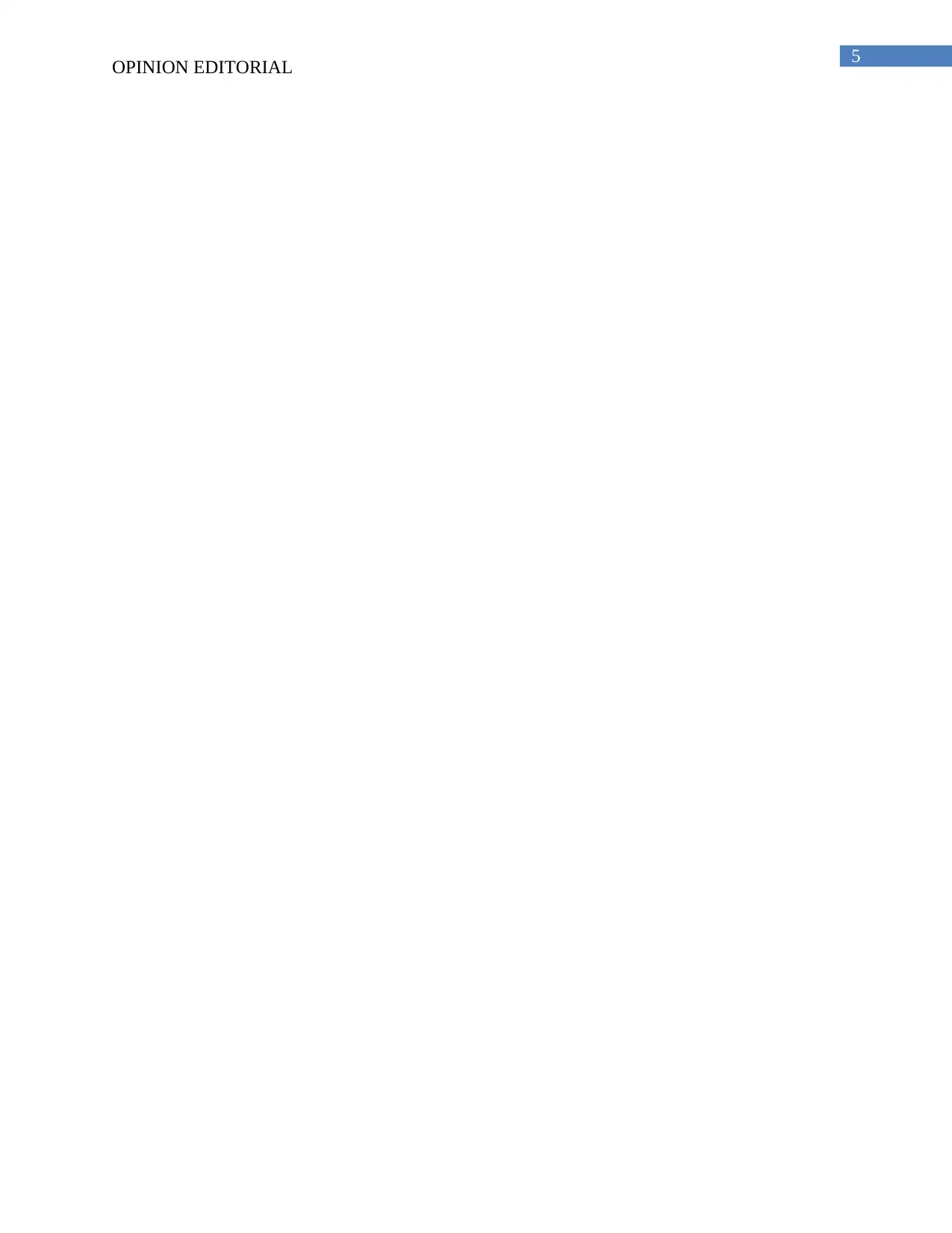
5
OPINION EDITORIAL
OPINION EDITORIAL
⊘ This is a preview!⊘
Do you want full access?
Subscribe today to unlock all pages.

Trusted by 1+ million students worldwide
1 out of 6
Related Documents
Your All-in-One AI-Powered Toolkit for Academic Success.
+13062052269
info@desklib.com
Available 24*7 on WhatsApp / Email
![[object Object]](/_next/static/media/star-bottom.7253800d.svg)
Unlock your academic potential
Copyright © 2020–2026 A2Z Services. All Rights Reserved. Developed and managed by ZUCOL.





